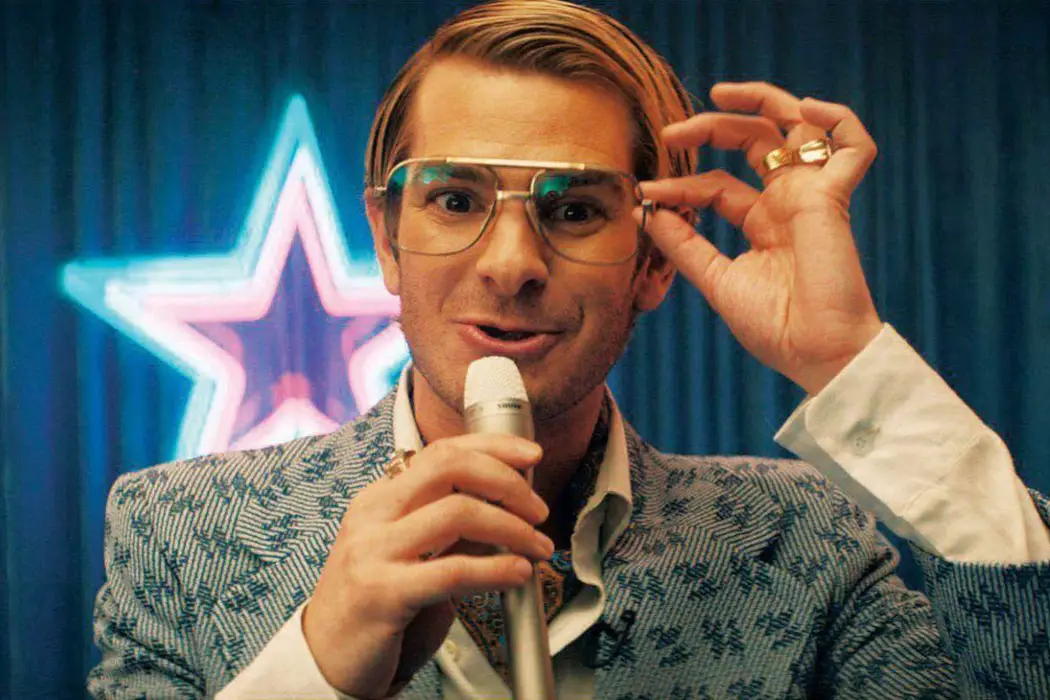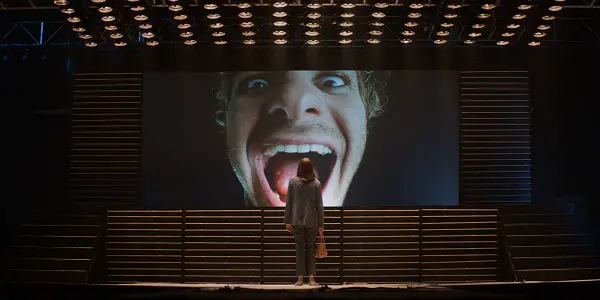MAINSTREAM: Vapidly Denouncing Vapidity

Morris is a student and cinephile from Singapore. He watches…
Remember when Under the Silver Lake was the hot mess of 2018? Premiering in competition at Cannes that year, David Robert Mitchell’s follow-up to his wildly terrifying It Follows gained as many cult fans as it did detractors; the former largely viewed it as a sprawling Lynchian interrogation of the conspiracy theory, navigating hidden strata of codes where there might be none, whereas the latter saw it as a self-congratulatory affront to serious and consequential filmmaking. At the centre of either interpretation was Andrew Garfield, playing an obnoxious stoner loner bored of the empty promises of a sunnily distant Los Angeles and beguiled by its uncanny fantasies of forbidden knowledge hidden beneath the surface. He stumbles around in a daze, piecing together potential clues in the hope of solving a mystery not rightfully his.
Where this lingering mystery allowed Under the Silver Lake an air of ominous ambiguity, the same cannot be said for Garfield’s latest foray into the postmodern. Mainstream, the sophomore feature of Gia Coppola (and also set in L.A.), lays its cards bare within the first half hour and proceeds to stomp on them for the rest of its duration. Tackling the artifice and superficiality of influencer culture with unbridled earnesty, it nonetheless falls victim to its own superficial trappings and toothless attempts at satire. Were it made a decade earlier, before the stratospheric advent of social media platforms and consumption, a case might yet be made on its uncanny prescience; as it is, Mainstream hardly qualifies as a satisfactory, much less intelligent response to the media-saturated simulacra it lounges very comfortably within.
Eat the Art
Garfield, retaining his edgy and cynical persona from Under the Silver Lake, assumes the role of Link, a pseudo-philosophical odd jobber dressed in various costumes and handing out free samples on the sidewalk. Frankie (Maya Hawke), a school dropout and barista at one of the city’s many lonely nightclubs, sees him one day dishing out cheese in a mouse suit. Wryly amused by it, she takes to filming him on her phone and, when caught, stammers out the excuse of filming a painting behind him instead. And so, in either an attempt to woo her or a fit of creative adrenaline, Link gathers a crowd before the painting and rants about the state of modern consumerism (“Eat the art!”, he advises as the necessary alternative). His rant is filmed by Frankie and posted online, where it goes viral.

What follows is an ascent to stardom that, predictably, goes awry. Frankie, eager to leave behind her humdrum nights pouring shots and enduring cheap humiliation from her manager, develops an infatuation for Link’s eccentric antics and contempt for all things mainstream. She even has trouble contacting him because he doesn’t have a phone. But soon a plan is in place, and Frankie ropes her co-worker Jake (Nat Wolff) in: Link, the provocateur, will assume the pseudonym ‘No One Special’ and film himself engaging in various pranks, stunts, whatever it is that influencers do. The catch is that his display of cultural and intellectual vacuity is meant as ironic self-criticism, for, ironically, the only way to be popular enough to expose the shallow trappings of internet fame is to achieve that fame in the first place.
Quickly the trio progress from sizeable YouTube personalities to studio-worthy content creators, even hiring an agent (Jason Schwartzmann) in the process. In a gameshow conceived by Jake, entitled Your Phone or Your Dignity, participants undergo scalding public humiliation from Link in order to prove their resilience and self-worth. Many cave. Accompanying his meteoric rise to fame is Link’s overnight transformation from wacky and mysterious tearaway into a titanic, messianic egomaniac. He terrorises his audience, pushes them beyond their breaking point, and when taken to task lashes out at his critics, accusing them of hypocritically employing similar tactics not to educate, but to inveigle.
And Shit it Out
On paper, Mainstream evokes a contemporary anxiety towards the superficial and increasingly pornographic (both figuratively and quite literally) modes of social communication and expression present in an era of smartphones and virtual performativity; where content creation used to be the sole purview of the literate and cultured, its democratisation at the hands of the Internet has let loose an unstoppable leviathan of indiscernible cultural noise. Yet, Coppola’s cautionary tale fails to impress any novelty onto a narrative already relevant when The Social Network was made. Frequently outdated and outmoded, her vision of vapid degeneration comprises a measly patchwork of emoji barrages, multi-layered textual cues, and — unsurprisingly — nudity intended to outrage in a scene where Link wanders the streets wearing nothing but a prosthetic penis.

The garish overtones of Mainstream come as an unwelcome surprise from Coppola, whose directorial debut with 2013’s Palo Alto displayed a refreshingly sensitive voice through which the tender melancholies of adolescence found articulation; even in Palo Alto’s sometimes rotely composed images of ennui lay a sincerity that placed its characters with the audience, not beneath them. Her follow-up, with an out-of-touch and monolithic conception of technological dystopia (playing, as it were, like a slighter version of the Black Mirror episode, Fifteen Million Merits), leaves much to be desired.
Little of this is Garfield’s fault — his devil-may-care attitude, which has of late begun to colour his filmic persona, enchants and exasperates in equal measure. And without a substantial screenplay, much of Mainstream is propped up by his character’s cynically violent metamorphosis into a monster of a man. This, however, points to another one of Coppola’s misguided directions. Her satire of consumer culture in the digital age curiously limits itself to Link, when it is not entirely convincing that one single individual should even have the agency to delineate his trajectory outside of the mainstream. A crude approximation of capitalist, influencer, and alleged satirist rolled into one, Link tries to stand for everything wrong with postmodern vapidity and succeeds, feebly; like him, the film casts its net into the open, clawing in vain at pockets of outrage and decade-old discourse. It is a tale full of sound and fury, signifying nothing.
What did you think of Mainstream? Let us know in the comments below!
Watch Mainstream
Does content like this matter to you?
Become a Member and support film journalism. Unlock access to all of Film Inquiry`s great articles. Join a community of like-minded readers who are passionate about cinema - get access to our private members Network, give back to independent filmmakers, and more.
Morris is a student and cinephile from Singapore. He watches just about anything under the sun, with the exception of mediocre feel-good comedies. His favourite film is "The Room" (2003), an excellent feel-good comedy.













